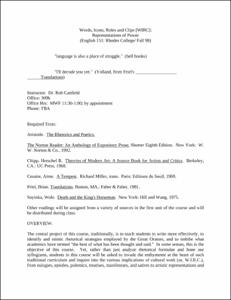Please use this identifier to cite or link to this item:
http://hdl.handle.net/10267/2941Full metadata record
| DC Field | Value | Language |
|---|---|---|
| dc.contributor.author | Canfield, Robert | - |
| dc.date.accessioned | 2008-12-02T20:43:47Z | - |
| dc.date.available | 2008-12-02T20:43:47Z | - |
| dc.date.issued | 1998-08-26 | - |
| dc.identifier.uri | http://hdl.handle.net/10267/2941 | - |
| dc.description | This syllabus was submitted to the Office of Academic affairs by the course instructor. | en_US |
| dc.description.abstract | The central project of this course, traditionally, is to teach students to write more effectively, to identify and mimic rhetorical strategies employed by the Great Orators, and to imbibe what academics have termed "the best of what has been thought and said." In some senses, this is the objective of this course. Yet, rather than just analyze rhetorical formulae and hone our syllogisms, students in this course will be asked to invade the enthymeme at the heart of such traditional curriculum and inquire into the various implications of cultural work (or, W.I.R.C.), from eulogies, epistles, polemics, treatises, manifestoes, and satires to artistic representations and dialogues to dramatic scripts to cinematic spectacles. Students will be asked to collectively interpret and discuss these cultural representations in light of a central theme: Representations of Power, and in light of the diverse critical perspectives they will engage. Working through a series of critical arguments, the course aims to develop crucial skills in critical thinking and articulation by promoting participation in the foundational ideologies, central concepts, and current debates that comprise our own roles in the teatrum mundi. | en_US |
| dc.language.iso | en_US | en_US |
| dc.publisher | Memphis, Tenn. : Rhodes College | en_US |
| dc.relation.ispartofseries | Syllabi CRN | - |
| dc.rights | Rhodes College owns the rights to the digital objects in this collection. Objects are made available for educational use only and may not be used for any non-educational or commercial purpose. Approved educational uses include private research and scholarship, teaching, and student projects. For additional information please contact archives@rhodes.edu. Fees may apply. | - |
| dc.subject | English, Department of | en_US |
| dc.subject | Syllabus | en_US |
| dc.subject | Curriculum | en_US |
| dc.subject | Academic departments | en_US |
| dc.subject | Text | en_US |
| dc.subject | 1998 Fall | en_US |
| dc.title | ENGL 151-04, Words, Icons, Roles and Clips, Fall 1998 | en_US |
| dc.type | Syllabus | en_US |
| Appears in Collections: | Course Syllabi | |
Files in This Item:
| File | Description | Size | Format | |
|---|---|---|---|---|
| 1998_fall_ENGL_151-04.pdf | 27.57 kB | Adobe PDF |  View/Open |
Items in DSpace are protected by copyright, with all rights reserved, unless otherwise indicated.